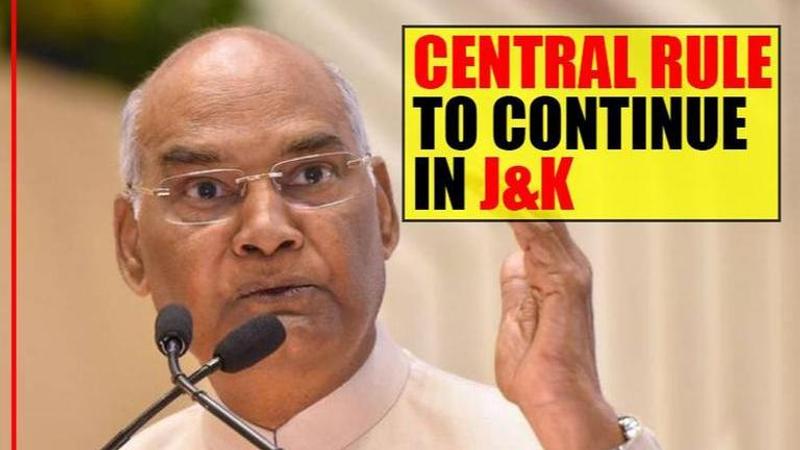Published 10:33 IST, October 31st 2019
Central rule to continue in J&K through Lieutenant Governor
The President's rule imposed in undivided Jammu and Kashmir was revoked on Thursday following the state's bifurcation into Union Territories.

The President's rule imposed in undivided Jammu and Kashmir was revoked on Thursday following the state's bifurcation into Union territories, but the central rule will continue for an indefinite period through the Lieutenant Governor (LG) in the UT of Jammu and Kashmir.
President Ram Nath Kovind issued two separate notifications on Thursday morning -- the first revoking the President's rule in undivided Jammu and Kashmir and subsequently, taking over the control of the administration of the UT of Jammu and Kashmir, which will be controlled through the LG now.
The two Union territories come into existence on Thursday after the central government, on August 5, decided to abrogate the special status given to Jammu and Kashmir under Article 370 of the Constitution and create the UTs on October 31.
"In exercise of the powers conferred by clause (2) of Article 356 of the Constitution, I, Ram Nath Kovind, President of India, hereby revoke the proclamation issued by me under the said Article on 19th December 2018 in relation to the State of Jammu and Kashmir," the first notification said.
In the second notification, President Kovind said Article 356 of the Constitution, under which President's rule was imposed in a state, was not applicable to the UTs and the provision in case of failure of the constitutional machinery with regard to the UT of Jammu and Kashmir, which has a legislature, was governed by section 73 of the Jammu and Kashmir Reorganisation Act, 2019.
Section 73 of the Act says in case of failure of the constitutional machinery -- if the president, on receipt of a report from the LG of the UT of Jammu and Kashmir, is satisfied (a) that a situation has arisen in which the administration of the UT of Jammu and Kashmir cannot be carried on in accordance with the provisions of this Act; or (b) that for the proper administration of the UT of Jammu and Kashmir, it is necessary or expedient to do so, the president may, by order, suspend the operation of all or any of the provisions of this Act for such period as he thinks fit and make such incidental and consequential provisions as may appear to be necessary or expedient for administering the UT of Jammu and Kashmir in accordance with the provisions of the Act.
The president, in the notification, said he had received a report from the governor of Jammu and Kashmir that the administration of the UT of Jammu and Kashmir could not be carried on in accordance with the provisions of the Constitution and the Jammu and Kashmir Reorganisation Act.
"In order to prevent any constitutional and administrative vacuum, it is necessary to invoke section 73 of the Jammu and Kashmir Reorganisation Act, 2019 for the proper administration of the UT of Jammu and Kashmir," he said.
The president said after considering the governor's report and other information, he was satisfied that a situation had arisen in which the administration of the UT of Jammu and Kashmir could not be carried on in accordance with the provisions of the Jammu and Kashmir Reorganisation Act.
"Now, therefore, in exercise of the powers conferred under section 73 of the Jammu and Kashmir Reorganisation Act, 2019, read with articles 239 and 239A of the Constitution, and of all other powers enabling me in that behalf, I hereby proclaim that I -- (a) assume to myself as President of India all functions of the Government of UT of Jammu and Kashmir and all powers vested in or exercisable by the LG of the UT of Jammu and Kashmir; (b) declare that the powers of the legislature or legislative Assembly of the Union territory of Jammu and Kashmir shall be exercisable by or under the authority of Parliament," the notification issued by the president said.
President Kovind also used the incidental and consequential provisions, which were necessary or desirable for giving effect to the objects of this proclamation.
"In exercise of the functions and powers assumed to myself by virtue of clause (a) of this Proclamation, it shall be lawful for me as President of India to act to such extent as I think fit through the LG for administering the UT of Jammu and Kashmir in accordance with the provisions of the Constitution and the JK Reorganisation Act, 2019," the notification said.
The central rule was first imposed in Jammu and Kashmir in June 2018, after the resignation of the then chief minister Mehbooba Mufti when the Bharatiya Janata Party (BJP) withdrew support to the state government led by the People's Democratic Party (PDP).
The first central rule as "Governor's rule" continued for six months. After the six-month period, President's rule was imposed for the next six months, which was subsequently extended with the approval of Parliament.
Article 356 of the Constitution, under which President's rule is imposed in a state, is not applicable to Union territories. G C Murmu and R K Mathur will be sworn-in as the first LGs of Jammu and Kashmir, and Ladakh respectively on Thursday. Ladakh is a Union Territory without a legislature like Chandigarh
Updated 10:55 IST, October 31st 2019




